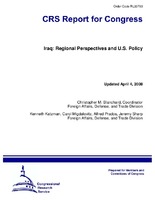| dc.description.abstract | Iraq’s neighbors have influenced events in Iraq since the fall of the Saddam
Hussein regime in 2003, and developments in Iraq have had political, economic, and
security implications for Iraq’s neighbors and the broader Middle East. Ongoing
violence in Iraq and discussion of options for modifying U.S. policy toward Iraq are
fueling consideration of Iraq’s future and the current and potential policies by Iraq’s
neighbors. Policymakers and observers are considering a number of different “Iraq
scenarios,” ranging from the resolution of outstanding Iraqi political disputes and the
successful consolidation of Iraq’s government and security forces, to a return of
sectarian violence and the potential for greater intervention by Iraq’s neighbors.
Understanding regional perspectives on Iraq and the potential nature and
likelihood of regional responses to various scenarios will be essential for Members
of the 110th Congress as they consider the future of U.S. policy, including post-troop
surge tactical options, the proposed U.S.-Iraq security agreement, and annual
appropriations and authorization legislation. The National Intelligence Estimate
(NIE) on Iraq released in August 2007 assessed that “Iraq’s neighbors will continue
to focus on improving their leverage in Iraq in anticipation of a Coalition
drawdown.” The NIE identified Iranian assistance to armed groups and the
“reluctance” of Iraq’s Sunni Arab neighbors to support the Iraqi government as
particularly problematic.
This report provides information about the current perspectives and policies of
Iraq’s neighbors; analyzes potential regional responses to continued insurgency,
sectarian and ethnic violence, and long-term stabilization; discusses shared concerns
and U.S. long-term regional interests; and reviews U.S. policy options for responding
to various contingencies. For more information on Iraq and regional perspectives,
see CRS Report RL31339, Iraq: Post-Saddam Governance and Security; CRS
Report RS22079, The Kurds in Post-Saddam Iraq; and CRS Report RS22323, Iran’s
Activities and Influence in Iraq. This report will be updated to reflect major
developments. |

